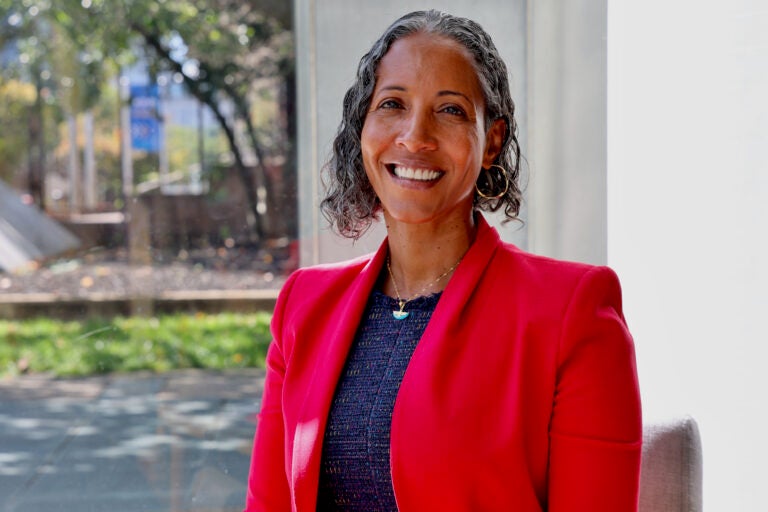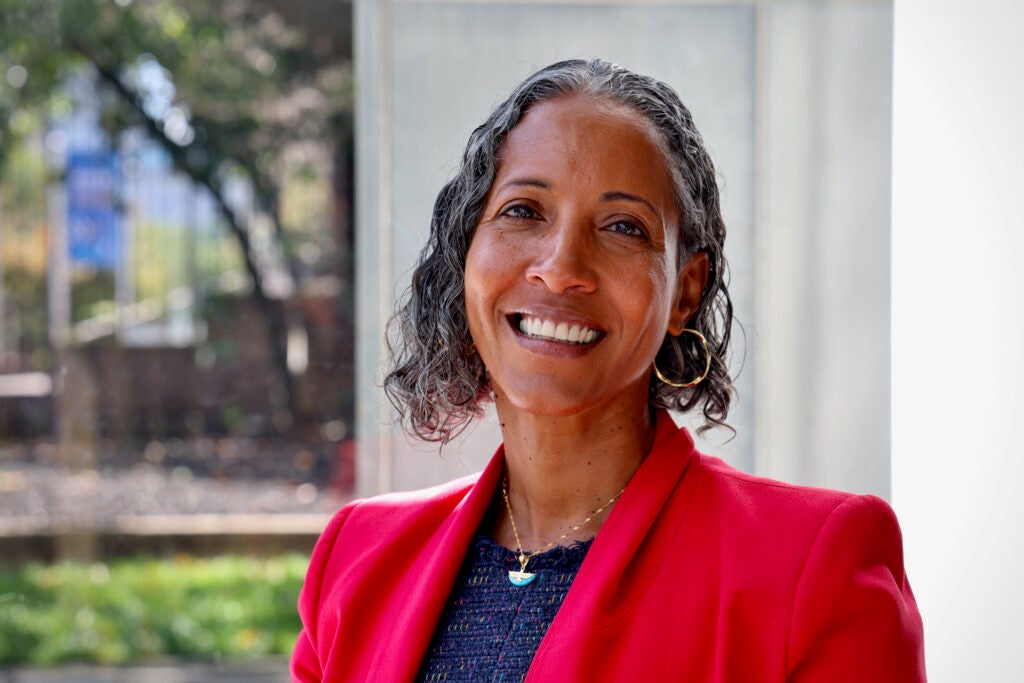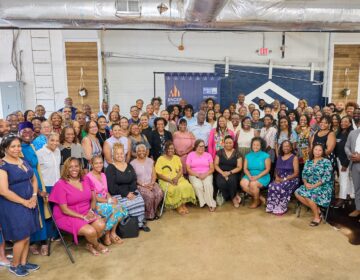Can investors reaping profits and social equity coincide? Here’s why one Philly CEO says yes
The new CEO of ImpactPHL wants to convince investors that they can earn a return while contributing to social justice. Here’s her big elevator pitch.
Listen 3:32
Kafi Lindsay is the new chief executive officer of ImpactPHL. (Emma Lee/WHYY)
From Philly and the Pa. suburbs to South Jersey and Delaware, what would you like WHYY News to cover? Let us know!
North Philadelphia native Kafi Lindsay keenly understands the value of access to credit and capital.
Her father owned a corner store in the city, and she worked there as a teenager.
“It was part of the fabric of the neighborhood,” Lindsay said. “He gave credit to people in a little black book.”
If there was a mother who needed a few extra dollars for food before she got her paycheck, she would get access to credit at the corner store, Lindsay said.
“And Mrs. Johnson would come in the next week and pay off the $5,” she said. “I just really saw the importance of commerce in a neighborhood and having somebody that would give you a $5 extension of credit so that you could get lunch meat for your kids and the importance of that.”
Decades later, after Lindsay graduated from Howard University Law School and became an accomplished attorney and executive, she never forgot that spark of inspiration and moral compass that had guided her from the start.
Now, she’s leading an organization that blends the interests of social justice advocates and business investors alike as the CEO of ImpactPHL.

The PHL sign is a moniker for the Philadelphia International Airport, which the nonprofit executive said encompasses the region for which the organization serves, not just within city limits. And the type of impact Lindsay and her team hopes to do is to spur social investing — encouraging individuals to channel their funds and not just donate it as grants, but invest it and get market rate returns while promoting social impact.
“There is money moving in markets every day, billions of dollars that are being invested whether it’s in the stock market or whether it’s into a corporation or a local business,” she said. “The power of impact investing is saying, ‘Let’s be intentional about those investments.’ We can still get returns but we can also move a neighborhood forward.”
ImpactPHL has worked with local foundations and endowments to realign $400 million with new advisors already.
And since the United States court system has increasingly ruled against affirmative action measures, Lindsay sees opportunity for capitalism — which has different limitations than philanthropy in America — to step in for that social equity mission without culture war interference.
In the past decade, there’s been a big push toward corporations adopting what’s known as environmental, social and governance — or ESG for short. It refers to when for-profit companies make decisions that are not exclusively about maximum financial returns but consider other factors like social justice and climate change.
Lindsay’s job now is to help ultra-high net worth individuals, foundations, charitable organizations and even businesses align their social justice missions with how their money is invested for returns that can help change communities for the better.
“ESG is a framework and I’d say impact investing is the strategy,” she said, highlighting her commitment to advancing these goals in Philadelphia. Notably, she’s built her career in finance through roles in major banks’ community partnerships and city service.
Most recently, Lindsay served with the city of Philadelphia under Mayor Cherelle Parker’s administration as the first director of strategic partnerships. She was the bridge between the nonprofit and philanthropic world and the city.
Some examples of social impact investing in the city include economic development efforts by nonprofits and for-profit partnerships, especially for redevelopment projects in neighborhoods where big investments are meant to kick-start the economy.
Like the $52 million project in Sharswood, a North Philadelphia neighborhood that had not seen a new full-service grocery store in 50 years. The new shopping plaza stretches along Ridge Avenue nearby the Philadelphia Housing Authority’s new headquarters.
Social impact investors were involved in securing the financing of that project, which included the 200,000-square-foot grocery store and an urgent care facility, in addition to 98 mixed-market rate and affordable housing units. As of this fall, the shopping center and apartment complex now includes a gym.
It was a public-private partnership with federal, state, local and private sector investors all chipping in together. It included Philadelphia Housing Authority (PHA) loans, financing leveraging the New Market Tax Credit program, Pennsylvania Redevelopment Assistance Capital Program grants and Philadelphia Industrial Development Corp. loans. And on the private investor side, the Woodforest CEI-Boulos Opportunity Fund, the community enrichment arm of Harris Blitzer Sports and Entertainment (HBSE), HBSE Real Estate and a crowdfunded group of local investors known as Small Change.
For example, about 54 investors who pitched in a total round of $751,250 organized by Small Change were promised 7% annual return.
As such, the Philadelphia Industrial Development Corporation, Commonwealth Cornerstone Group and Capital One Bank leveraged $28.5 million of those new market tax credits. The Philadelphia Housing Authority is both the senior lender and a partner in the project.
One supporter of that project and a notable Philadelphia social investor group Shift Capital shared in its annual report that the Sharswood project created 87 temporary jobs during construction, added 20 jobs to the neighborhood, supported two minority business enterprise tenants and developers spent $558,448 with local vendors.
The project had 29% of the residential units at 80% Philadelphia’s area median income or less — which is $64,250 for a household of one person — and about 17% of the residential units are considered “deeply affordable,” according to Shift Capital.
“The Philadelphia Housing Authority decided to make that intentional investment and move their headquarters to Ridge Avenue,” Lindsay said. “They were able to develop that commercial corridor space as well with the intention that they would lease to Black and [Latino] and women-owned businesses. They’re getting returns, right? They’re not giving space away for free. That’s impact investing.”
Lindsay previously worked for the PHA as an attorney during her career.
But that doesn’t mean social impact investing is without risk. While Shift Capital has completed projects like those in Kensington, too, other projects by the same developer have taken longer than planned.
Shift Capital’s financing for the much-anticipated redevelopment of the Buery Hotel in North Philadelphia fell $23 million short in recent months.
And it’s still unclear when the proposed North Station District at the intersection of North Broad Street and Lehigh Avenues will begin redevelopment work.
But Philadelphia isn’t the only community where social impact investing is happening.
There are even private equity funds with a social equity lens, like Blackstar, which has changed its name to Blackstar Stability.
It’s a real estate fund based in Washington that purchases predatory home loans — known as contract deeds — and converts them into real affordable mortgages for the people who got scammed so they can stay in their homes.
Blackstar has raised $100 million from investors to purchase these distressed loans, which means people living in the homes who were behind on their mortgages and had entered into contracts without guarantee of building any equity in the home, then they worked to keep those families from being evicted through the foreclosure process. The private equity executives visited Philadelphia in recent months to pitch their idea to local investors.
Blackstar expects to reinvest the profits into a second round of funding to buy yet another package of distressed loans on the market — which investors can buy like past-due medical debt — for pennies on the dollar. And that’s the business model: buy cheap, then leverage that for regular investor returns.
While Philadelphia struggles with homeownership and affordability, it’s unclear whether Blackstar will be investing in this market or purchasing contract deeds in the city.
But Lindsay said she believes the real transformation starts with transparency.
Understanding how money is invested whether as a high-net-worth individual who may be what’s known as an accredited investor, or even an individual’s 401K or pension fund investments.
Sometimes individuals and organizations simply don’t know because the investment vehicle is opaque and the portfolio mix unavailable until requested.
There was an undisclosed institution ImpactPHL once worked with prior to Lindsay’s arrival that wanted help digging into their investment portfolio.
That institution was “very focused on racial equity,” according to their mission.
“When they pulled up their [investment] portfolio, they saw they were invested in private prisons,” she said. “So that was a big aha moment for them. If racial equity is one of their values, that investment in private prisons probably isn’t it. So they had an opportunity to go back to their financial advisors and say, ‘We want to adjust our portfolio so that it’s invested in a way that reflects our values.’”

Get daily updates from WHYY News!
WHYY is your source for fact-based, in-depth journalism and information. As a nonprofit organization, we rely on financial support from readers like you. Please give today.







